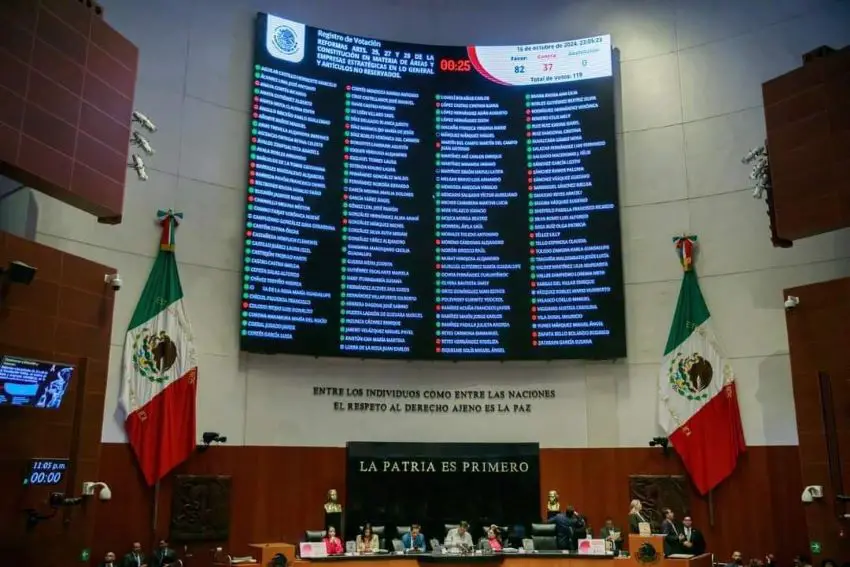Mexico’s Senate approved the federal government’s energy reform bill early Thursday, passing legislation that seeks to constitutionally enshrine state dominance in the electricity sector, among other goals.
Senators from the ruling Morena Party and its allies voted to approve the bill after midnight, as did Senator Miguel Ángel Yunes Márquez’s National Action Party (PAN), who confirmed that the two-thirds threshold for passing the constitutional reform proposal had been met.

The final tally was 86 votes in favor, 39 votes against and one abstention.
The bill, submitted to Congress by former president Andrés Manuel López Obrador in February and approved by the House of Representatives last week, will now be considered by Mexico’s 32 state legislatures for ratification.
At least 17 states must ratify the reform proposal before President Claudia Sheinbaum can sign it into law. Ratification by a majority of state Congresses is essentially a fait accompli because Morena is in power in more than 20 states. Sheinbaum is expected to sign the bill.
‘Historic mistake’
Enactment of the bill would result in a partial repeal of the 2013 energy reform, which opened Mexico’s energy sector, including the state-owned Federal Electricity Commission (CFE) and state-owned oil company Pemex, to private investment.
Although this reform will limit the participation of private and foreign companies in Mexico’s electricity sector, it will not prevent them from playing an important role in ensuring that Mexico can meet electricity demand and transition towards greater use of environmentally friendly energy sources.

However, Morena Senator Óscar Cantón Zetina said that the aim of the bill is to “reverse the historic mistakes” made by former president Enrique Peña Nieto’s energy reforms (2012-2018).
Recalling his approval, Morena Senate leader Gerardo Fernández Noroña said it was a “historic day” for Mexico.
Several other constitutional reforms, including one that allows citizens to directly elect all judges and another that places the National Guard under military control, have been approved by Congress since recently elected lawmakers took their positions on September 1.
What are the key aspects of energy reform?
- Upon enactment, Mexican states through the Federal Electric Commission will have the constitutional right to generate and supply the majority (54%) of electricity in Mexico. Private companies will share the remaining 46% of the market.
- The CFE and the state oil company Pemex are no longer called “productive” state companies, but rather “public” state companies. According to a Senate press release, CFE and Pemex were renamed “productive” state companies on the recommendation of “international financial organizations.” The name change “distorts the state’s obligation to guarantee public services in the electricity sector and reduces it [its obligation] to simply make a profit,” the statement said.
- Bloomberg news agency reported that President Sheinbaum would “gain increased control over Pemex and the national power company” if the reform bill is signed into law. “The reclassification of Pemex and CFE from “state productive enterprises” to “public enterprises” … will force companies to prioritize the government’s social and economic goals over corporate profits,” Bloomberg said.
- The newspaper El Sol de México reported that the CFE and Pemex “will lose their operational autonomy” and will once again “come under government control” once the reform bill is passed into law.
- The bill states that the CFE is obliged to provide electricity at the lowest possible price. CFE will also be able to provide internet service once the bill becomes law.
- According to the bill, secondary legislation would regulate how private companies can participate in Mexico’s electricity market. An earlier version of the bill gave Mexican states full responsibility for the energy transition. However, that provision was removed, ensuring that private companies can operate renewable energy facilities in Mexico and thereby help the federal government achieve its renewable energy targets.
- According to the bill, state energy companies would not be considered to have a monopoly, even if they have complete control over an industry, as is the case with Mexico’s nascent lithium sector with state company Litio para México (Lithium for Mexico).
- The bill “returns energy sovereignty to the country,” said Senator Cantón Zetina, “given that it establishes that electricity, hydrocarbons, lithium and the internet will no longer be objects of speculation and monopoly by private interests.”
Competing views on energy reform
Morena Senator Laura Itzel Castillo Juárez said that approval of the reform bill provides a “decisive step” towards restoring Mexico’s energy sovereignty because the law reverses changes made in 2013.
During Peña Nieto’s six-year term, the government’s goal was to “dismantle” CFE and Pemex, “turning them into scrap and handing them over to the highest bidder,” he said.
Green Party Senator Virgilio Mendoza Amezcua said that energy reforms in 2013 left the sector “weakened, indebted and at the mercy of the government. [private] economic interests.”
The bill approved by the Senate will allow past mistakes to be corrected, he said, adding that the bill will support the CFE and Pemex, as well as Mexico’s efforts to develop its lithium sector.

Labor Party Senator Alberto Anaya Gutiérrez stated that “the door is open [still] open to foreign capital” in the energy sector, but said the reforms would ensure that the Mexican state takes a leading role in the country’s electricity and oil industries.
Meanwhile, PAN Senator Imelda Sanmiguel Sánchez emphasized that the reform aims to “burden” Mexicans with debts to the CFE and Pemex, the most indebted oil companies in the world.
The future of the next generation will be at risk “under nationalist arguments regarding energy sovereignty,” he said.
PAN Senator Ricardo Anaya, a presidential candidate in 2018, questioned the need to limit the participation of private companies in electricity generation.
“We believe this is foolish because ultimately what society wants are three things: clean energy, number one; cheap energy, number two; and abundant energy, number three,” he said.
“We cannot support reform while the CFE continues to use fuel oil to generate electricity,” Anaya said.
Although former president López Obrador championed the use of fossil fuels to generate electricity, President Sheinbaum committed to increasing the use of renewable resources and pledged to invest approximately US $13 billion in an energy plan focused on renewables.
On Wednesday, Senator Ricardo Anaya also said that the reform could pose difficulties for Mexico at the 2026 review of the UMSCA free trade pact because the agreement limits foreign investment in the energy sector.
Institutional Revolutionary Party Senator Mely Romero Celis asserted that the reforms “subsidize inefficiencies” at the CFE and Pemex and are “a step backwards disguised as progress.”
He also stated that CFE and Pemex do not have the capacity to support themselves without collaborating with private companies.
With reports from El Financiero, La Jornada, Latinus, Aristegui Noticias and El Sol de México






